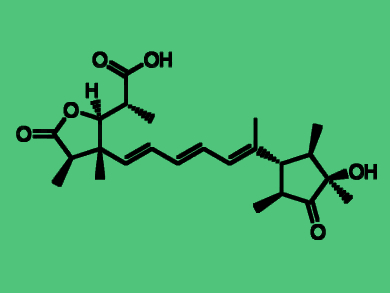Polyenes, compounds with alternating double and single carbon–carbon bonds, can be produced in fungi by certain enzymes, e.g., enoyl reductase-less highly-reducing polyketide synthases (ER-less HR-PKSs). Some of these polyenes, such as citreoviridin and aurovertin B, have been tested as antitumor agents.
Yi-Ming Chiang, University of Southern California, Los Angeles, USA, and Chia Nan University of Pharmacy and Science, Tainan, Clay C. C. Wang, University of Southern California, and colleagues have used genetic engineering of the fungus Aspergillus nidulans to produce a new type of polyenes. The team identified a four-gene cluster (named sdg), which encodes an ER‐less HR‐PKS and two enzymes which could be responsible for the cyclization of a polyketide precursor.
The researchers replaced the native promoters, the region of DNA that causes the transcription of a gene, with inducible promoters in different sdg genes and then induced expression. Using this approach, they successfully isolated several new fungal polyenes, named the aspernidgulenes (example pictured). This work could pave the way for future genome mining and genetic engineering to produce unnatural fungal polyenes.
- Discovery and Elucidation of the Biosynthesis of Aspernidgulenes: Novel Polyenes from Aspergillus Nidulans by Using Serial Promoter Replacement,
Tzu-Shyang Lin, Bethany Chen, Yi-Ming Chiang, Clay C. C. Wang,
ChemBioChem 2018.
https://doi.org/10.1002/cbic.201800486




